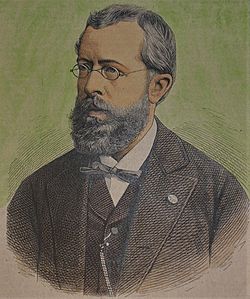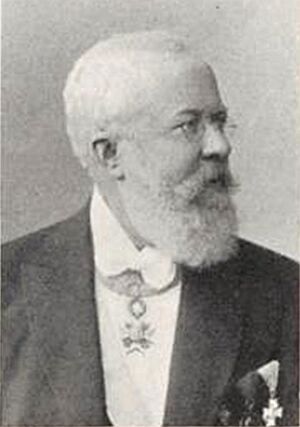Johannes Fastenrath facts for kids
Quick facts for kids
Johannes Fastenrath
|
|
|---|---|

Johannes Fastenrath (1877)
|
|
| Born | 3 May 1839 Remscheid |
| Died | 16 March 1908 (aged 68) Cologne |
Johannes Fastenrath (born May 3, 1839 – died March 16, 1908) was a German writer and translator. He was especially known for his love of Spain and its culture. He helped many German readers learn about Spanish literature and history. He also introduced German culture to Spanish readers.
Contents
A Life of Learning and Travel
Johannes Fastenrath was born in Remscheid, Germany. He loved learning and studied at many famous universities. These included Bonn, Heidelberg, Munich, Berlin, and Paris.
He traveled a lot in Spain during 1864, 1869, and 1879. These trips inspired him to write many poems in German. These poems were written in a Spanish style. Some of his poetry books include Ein spanischer Romanzenstrauss (meaning "A Spanish bouquet of romances") and Hesperische Blüten ("Hesperian blossoms"). He also wrote Immortellen aus Toledo ("Everlastings from Toledo").
Connecting Cultures Through Translation
Johannes Fastenrath was a very important translator. In his book Das Buch meiner spanischen Freunde ("The book of my Spanish friends"), he shared the work of Spanish poets with German readers. He translated many of their poems into German.
He also translated a Spanish play into German. This play was called La Receta contra las Suegras by Manuel Juan Diana. In German, it was known as Rezept gegen Schwiegermütter, which means "Recipe Against Mothers-in-Law."
Fastenrath also helped Spanish readers learn about German culture. He wrote La Walhalla y las glorias de Alemania ("Valhalla and the glories of Germany"). This book described important German figures. It was written in an interesting essay style for Spanish audiences. For example, he wrote about Hermann, a famous German hero.
His book Pasionarias de un Alemán-Español ("Books of passion from a German-Spaniard") described the Oberammergau Passion Play. This play is a famous religious performance. Through his many original books and translations, Fastenrath taught Germans a lot about Spanish literature and history.
He also wrote a book of war songs. It was called Den deutschen Helden von 1870 ("To the German Heroes of 1870"). These songs were inspired by the Franco-Prussian War.
His Legacy and Family
Fastenrath married Luise Goldmann (1858-1914). She was from Hungary and was the sister of writer Anna Forstenheim. Luise was very dedicated to keeping her husband's memory and interests alive.
In 1889, Luise was honored as the queen of the Floral Games in Barcelona. After Johannes Fastenrath passed away, Luise used his legacy to create two foundations in 1909. These foundations were named the "Fundación Premio Fastenrath" and the "Premi Fastenrath." These awards celebrate writers who create amazing works in Spanish and Catalan language, respectively.
See also
 In Spanish: Johannes Fastenrath para niños
In Spanish: Johannes Fastenrath para niños
 | Aaron Henry |
 | T. R. M. Howard |
 | Jesse Jackson |


